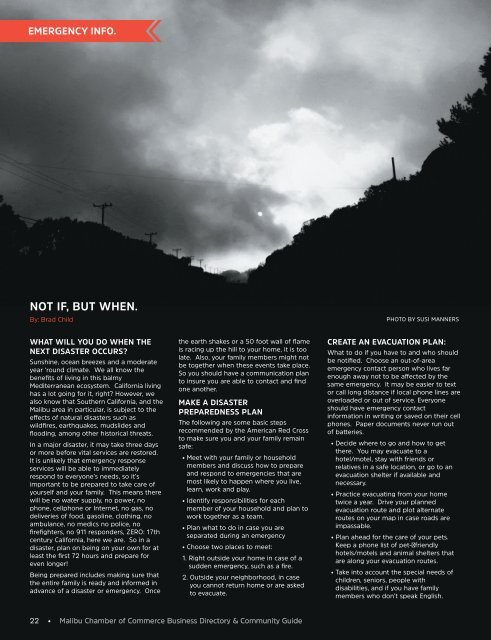Malibu - The Guide - 2016 Malibu Chamber of Commerce Business Resource & Community Guide
You also want an ePaper? Increase the reach of your titles
YUMPU automatically turns print PDFs into web optimized ePapers that Google loves.
EmErgENCy iNFo.<br />
NoT iF, buT wHEN.<br />
By: Brad Child<br />
PHOTO BY SUSI MANNERS<br />
wHaT will you Do wHEN THE<br />
NEXT DiSaSTEr oCCurS?<br />
Sunshine, ocean breezes and a moderate<br />
year ‘round climate. We all know the<br />
benefits <strong>of</strong> living in this balmy<br />
Mediterranean ecosystem. California living<br />
has a lot going for it, right? However, we<br />
also know that Southern California, and the<br />
<strong>Malibu</strong> area in particular, is subject to the<br />
effects <strong>of</strong> natural disasters such as<br />
wildfires, earthquakes, mudslides and<br />
flooding, among other historical threats.<br />
In a major disaster, it may take three days<br />
or more before vital services are restored.<br />
It is unlikely that emergency response<br />
services will be able to immediately<br />
respond to everyone’s needs, so it’s<br />
important to be prepared to take care <strong>of</strong><br />
yourself and your family. This means there<br />
will be no water supply, no power, no<br />
phone, cellphone or Internet, no gas, no<br />
deliveries <strong>of</strong> food, gasoline, clothing, no<br />
ambulance, no medics no police, no<br />
firefighters, no 911 responders, ZERO: 17th<br />
century California, here we are. So in a<br />
disaster, plan on being on your own for at<br />
least the first 72 hours and prepare for<br />
even longer!<br />
Being prepared includes making sure that<br />
the entire family is ready and informed in<br />
advance <strong>of</strong> a disaster or emergency. Once<br />
the earth shakes or a 50 foot wall <strong>of</strong> flame<br />
is racing up the hill to your home, it is too<br />
late. Also, your family members might not<br />
be together when these events take place.<br />
So you should have a communication plan<br />
to insure you are able to contact and find<br />
one another.<br />
maKE a DiSaSTEr<br />
PrEParEDNESS PlaN<br />
<strong>The</strong> following are some basic steps<br />
recommended by the American Red Cross<br />
to make sure you and your family remain<br />
safe:<br />
• Meet with your family or household<br />
members and discuss how to prepare<br />
and respond to emergencies that are<br />
most likely to happen where you live,<br />
learn, work and play.<br />
• Identify responsibilities for each<br />
member <strong>of</strong> your household and plan to<br />
work together as a team.<br />
• Plan what to do in case you are<br />
separated during an emergency<br />
• Choose two places to meet:<br />
1. Right outside your home in case <strong>of</strong> a<br />
sudden emergency, such as a fire.<br />
2. Outside your neighborhood, in case<br />
you cannot return home or are asked<br />
to evacuate.<br />
CrEaTE aN EVaCuaTioN PlaN:<br />
What to do if you have to and who should<br />
be notified. Choose an out- <strong>of</strong>- area<br />
emergency contact person who lives far<br />
enough away not to be affected by the<br />
same emergency. It may be easier to text<br />
or call long distance if local phone lines are<br />
overloaded or out <strong>of</strong> service. Everyone<br />
should have emergency contact<br />
information in writing or saved on their cell<br />
phones. Paper documents never run out<br />
<strong>of</strong> baמּeries.<br />
• Decide where to go and how to get<br />
there. You may evacuate to a<br />
hotel/motel, stay with friends or<br />
relatives in a safe location, or go to an<br />
evacuation shelter if available and<br />
necessary.<br />
• Practice evacuating from your home<br />
twice a year. Drive your planned<br />
evacuation route and plot alternate<br />
routes on your map in case roads are<br />
impassable.<br />
• Plan ahead for the care <strong>of</strong> your pets.<br />
Keep a phone list <strong>of</strong> pet- friendly<br />
hotels/motels and animal shelters that<br />
are along your evacuation routes.<br />
• Take into account the special needs <strong>of</strong><br />
children, seniors, people with<br />
disabilities, and if you have family<br />
members who don’t speak English.<br />
22 • <strong>Malibu</strong> <strong>Chamber</strong> <strong>of</strong> <strong>Commerce</strong> <strong>Business</strong> Directory & <strong>Community</strong> <strong>Guide</strong>


